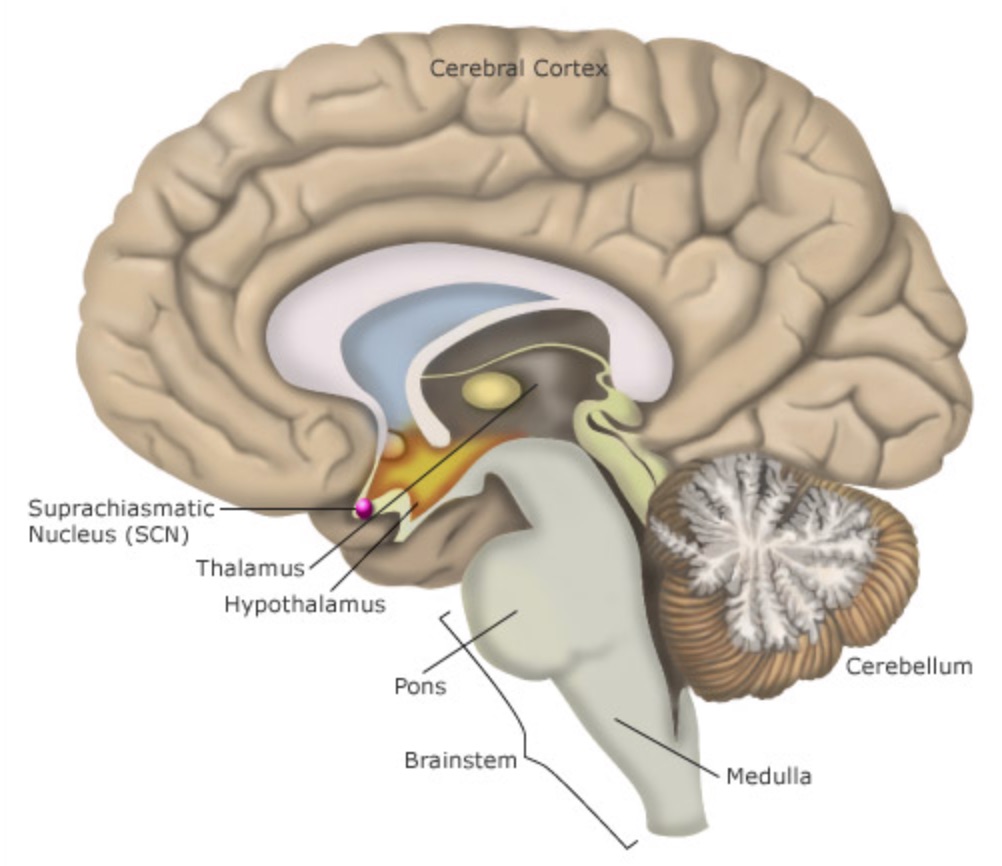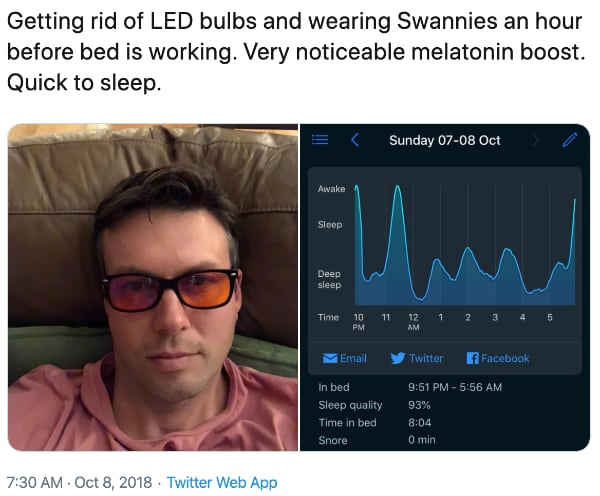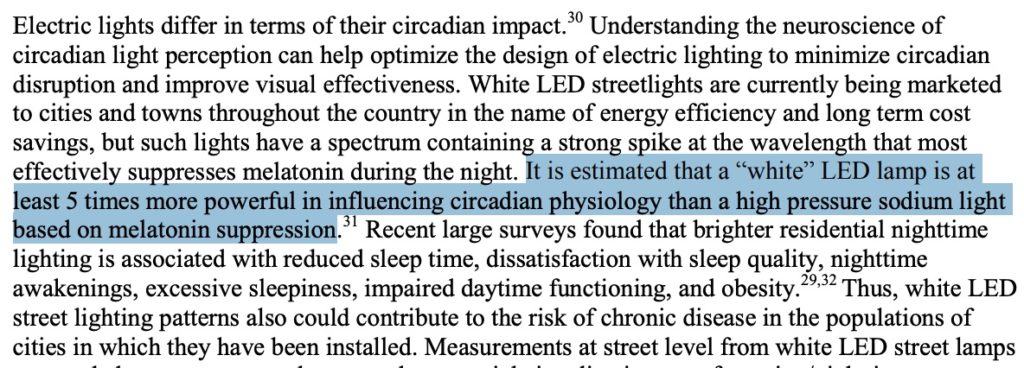I make a point to support my fellow entrepreneur's by purchasing their products, documenting the checkout experience, product experience and giving them feedback. I get a chance to see how others are operating and helping others always seems to come back to me later down the road.
A guy in one of my mastermind groups owns a blue light blocking glasses brand called Swannies. I'd long been a fan of the Bulletproof podcast for finding ways to optimize my life, particularly my health and Dave Asprey was regularly promoting the use of blue blocking glasses. I was 100% dismissing Asprey's pitch for two reasons:
- I'd begun to realize he is very aggressive with his promotion of life hacks for which he had a product to sell and thus I was taking everything with a grain of salt.
- The glasses are less than attractive.
But I ran into some shocking info about sleep and eye damage that motivated me to at least try the glasses.
So I ordered the standard amber lens Swannies and put them on around sundown the first night. What happened next was a huge surprise.
Within around 40 minutes I began to feel very drowsy. It was only 8PM. Maybe it was just placebo but this was a strong sensation of yawning and eagerness to go to sleep. It felt like I'd taken a pretty heavy dose of melatonin but I had not. I didn't fight it, went to bed, straight to deep sleep and had a quality night.
I began to wear the glasses every evening after sundown and repeated the drowsiness 100% of the time. I watched TV with them on (it does distort the colors some) and occassionally used the iPhone some.
The do look goofy. A friend asked if they made me look like Bono. "More like a mashup of Elvis Costello, a gun range fanatic, and Bono". But I don't care really. The sleep is too good.
I began read more and discovered the cause. The wavelength of blue light emitting from our screens and our energy efficient LED and flourescent bulbs is the same as the blue light from the sun. And our amazing design is such that our cyrcadian rhythm depends on that blue light to reset our sleep cycle. Our body and mind keeps an internal clock known as the suprachiasmatic nucleus (SCN) to remind us when to go to sleep but in order to adjust the timing of the clock our brain relies the reception of blue light. If you've ever crossed time zones and experienced jet lag for a day or two it is your internal clock causing the sleep disruption and the blue light from the sun is used to reset that clock in a few hours to a day.
The blue light enters the eyes, is transmitted to the SCN which stimulates signals that offets the sleep drive. These signals adjust dozens of internal functions such as body temperature and various hormones and surpresses the release of the hormone melatonin to wake you up.

I began to research a bit further and discovered the American Medical Association was so concerned about the danger of sleep disruption from LED lights it sent wrote a notice attempting to persuade municipalities across the US to reconsider their approach to replacing high pressure sodium street lights with modern LED street lights.
Side note: It seems most cities ignored the AMA and pushed forward with the feel good green initiative which not doubt improved their projected future budgets for electricity. The city of Raleigh did this and suddenly one night my house was lit up like a Target store with all our lights off inside. I put in a request to the city to fix it and within days they'd done something. The street light by my house now looks much dimmer and possibly has a shield added to stop it from shining into my windows.
You'll Rot Your Eyes Out
Sleep disruption isn't the only problem with LED bulbs. There is also strong evidence they damage our eyes. Unlike an old school incandescent or halogen bulb, a LED isn't a steady stream of light despite appearances. Instead there is a diode rapidly switching light on and off. It's too fast for us to consciously perceive the switching and we think we only see a solid stream of light. However our eyes do detecting the flickering on and off and our retina attempts to deal with this unnatural light. The result in tests with rats is rapid necrosis of the retina. You read correct.... the retina rots.
LED Will Damage Your Brain and Age You Faster
Researchers at Oregon State University found "..evidence suggesting that increased exposure to artificial light is a risk factor for sleep and circadian disorders".
Worse they found LED light produced brain damage, damage to the retina in the eyes, and accelerated aging stating "The fact that the light was accelerating aging in the flies was very surprising to us..."
Replace LED Bulbs with Incandescent
The damage to sleep and eyes are too concerning for me to keep running LED bulbs. I replaced all bulbs in our bedroom, the children's bedrooms, and our bathrooms with incandescent bulbs. I found you can now buy incandescents that are designed to last much longer than the standard bulbs you see in big box, and grocery stores. These 20,000 hour incandescent bulbs truly seem to last as long as they promise.
The rest of the LED bulbs in the house are being replaced as they die. Fortunately I've found they only really last a year to 18 months despite the package promise of 20 year life.
Screens Overstimulate Even with Blue Blocker Glasses
The best sleep hygeine seems to include putting down the phone, tablet, computer a good 2 hours before bed. Even with the night time lighting mode enabled on the device and even when wearing the blue blocking glasses I still find it has the effect of waking me up rather than allowing me to settle down. I do best when I regularly avoid before bed. I will say I'm pretty bad at keeping this habit and only go back to it when I've started to run into too many consecutive poor sleep nights requiring melatonin and CBD.
More Sunlight to Enhance the Waking Portion of Cyrcadian Rhythm
Lastly I'm exposing myself to as much sunlight as I can get during the day. I walk more places when it isn't necessary to drive and cross the street to get as much sun hitting my face as possible. Thanks to cryptomedici's persuasion I've stopped wearing sunglasses even when I'm driving. Once you stop using them you realize how unnecessary the habit is. I seek out sunny windows in the coffee shop and when it's warm enough outside I'll strip down and lie in the sun for 15-30 minutes. I try to hit the time of day with the most vitamin D potential as noted by the clever D-Minder app which tracks the time of day, year, and your geo location for maximum solar blast.
Only just recently I've started testing out stand up tanning beds periodically in the dead of winter to see if I can get a bit of a seratonin boost like I feel on summer days when I get strong sun exposure.
All of this sun exposure this seems to provide a more nuanced impact on sleep as I can't say I feel an immediate effect. I do seem to notice more tension and elevated stress both during the day and at night when I spend too much time indoors with no walks.
My Rating
I rate this change of wearing blue light blocking glasses at night and replacing bulbs you'd be exposed to mostly before bed rather high due to the very noticeable change in my drowsiness before bed and ability to recreate the experiment night by night. I give it a slightly lower degree of confidence because it's possible some of the effect I feel is placebo though my first experience when I was highly skeptical suggests it isn't.



